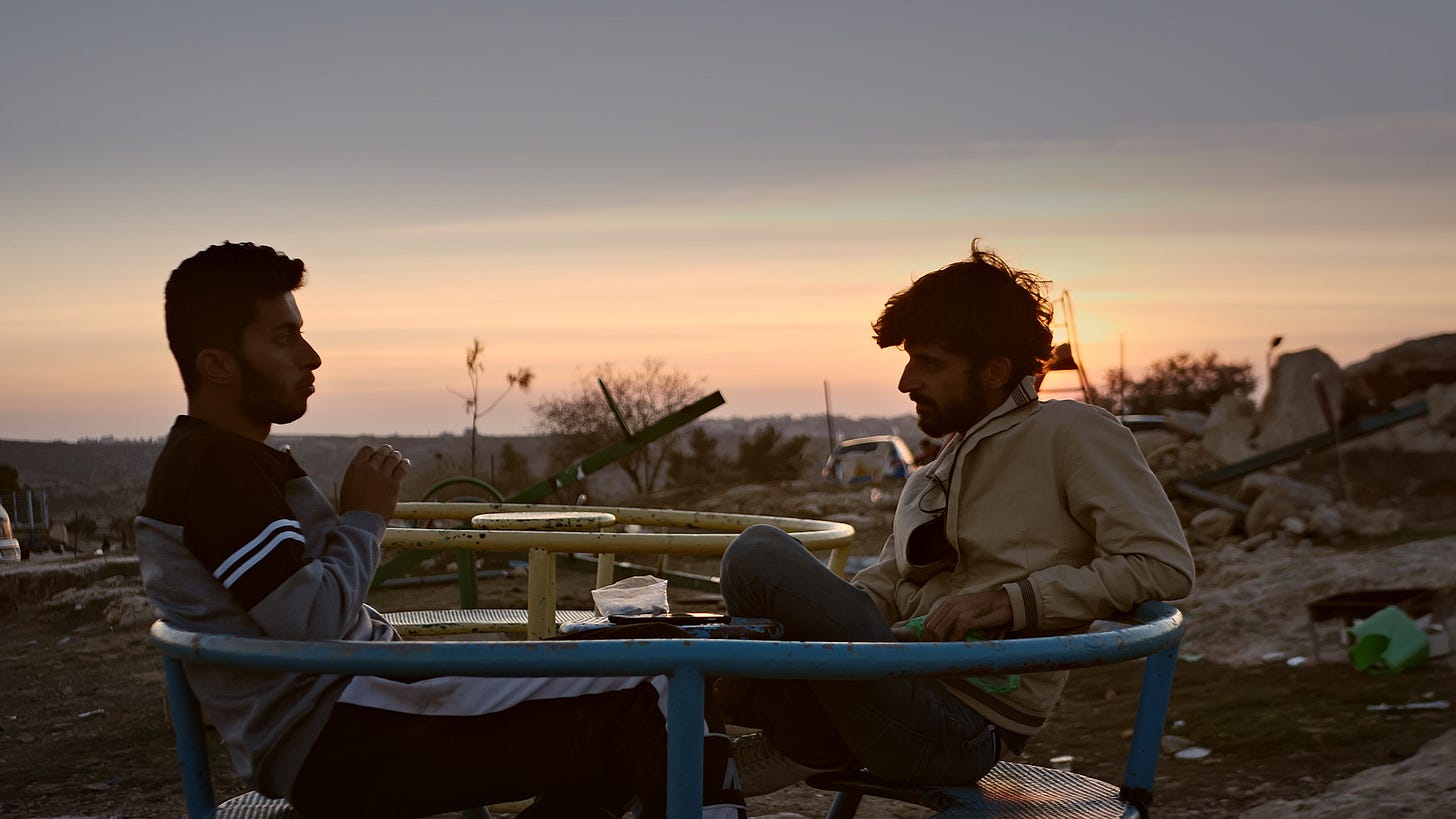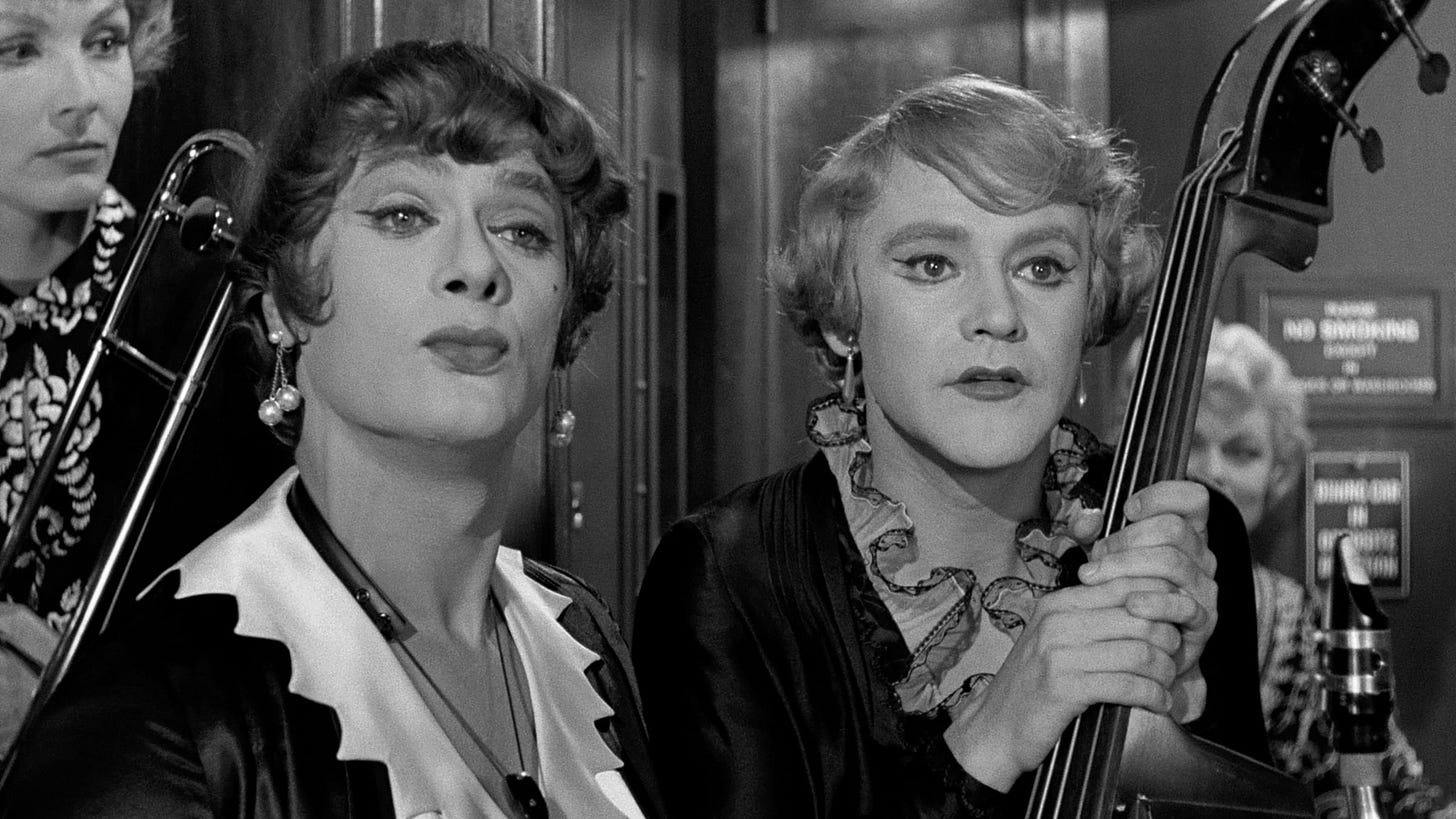Extremely late with this one, but here’s everything I watched in May! I started the month by finally seeing No Other Land (2024) in the final week of its run at Film Forum. Then, I revisited Some Like It Hot (1959) and got introduced to Avanti! (1972), two Billy Wilder classics that screened as part of the theater’s Jack Lemmon 100 festival.
Let’s get into it:
No Other Land (2024, dir. Basel Adra, Hamdan Ballal, Yuval Abraham, and Rachel Szor) — Filmed between 2019 and 2023, with production wrapping in October 2023, No Other Land (2024) chronicles the erosion of Masafer Yatta, a collection of Palestinian villages in the occupied West Bank, at the hands of the Israeli military. An Israeli court order reallocates this site filled with Palestinian families and farmland as a military training ground. Day after day, Palestinian activist Basel Adra records as Israel’s military bulldozes the homes and farms that comprise his community.
A co-production between Palestine and Norway, No Other Land won the 2025 Oscar for Best Documentary Feature Film. It stems from a collaboration between Palestinian and Israeli filmmakers: Adra, Hamdan Ballal, Yuval Abraham, and Rachel Szor. Abraham and Szor, both Israeli, traveled to Masafer Yatta to write about these forced displacements in 2019. Upon arrival, they met and befriended Adra and Ballal, leading to the documentary’s development. As Abraham tells Variety:
When I learned Arabic…it really changed my life. I feel as though I’d had one eye closed and learning Arabic opened the other eye. I started to meet Palestinians and I started to understand the reality of life under the military occupation in the West Bank. And I remember specifically I was writing a journalism piece in Jerusalem and I witnessed a guy in Jerusalem, a Palestinian, whose home was demolished. And I remember him and his four-year-old daughter looking at it. I was shocked to see this, demolishing a home in front of a person. So I began researching this phenomenon. When I was growing up, people around me told me Palestinians were building illegally and that is why we were destroying their homes with bulldozers. But when I did my research I realized that actually there is a law that systematically prevents Palestinians from getting building permits, and that this law is part of taking over their land. And that’s how I got to Masafer Yatta. And I met Basal and we connected in this fight against injustice and created the collective.
Contrast shapes No Other Land. Adra and Abraham converse throughout the documentary, the gap in their living conditions emblematic of the oceanic breach between Israeli and Palestinian autonomy. Meanwhile, images of animals grazing, the sun setting, over arid land juxtapose with the bulldozers’ man-made destruction. As arts writer Adrian Horta describes in her review for The Guardian, “the film’s last recorded image is of a group of rogue settlers approaching Masafer Yatta with guns. But No Other Land, for its many images of despair, still offers a stirring vision for what could be.” It makes a case for collaboration, underscoring the need for a cross-cultural fight toward Palestinian freedom.
Where to Watch: Unfortunately, No Other Land does not have a U.S. distributor, but U.K-based subscribers can rent it on Amazon Prime Video, Apple TV, and YouTube.
Some Like It Hot (1959, dir. Billy Wilder) — As a Letterboxd rando puts it: “this is the closest thing to a depression cure I have.” Some Like It Hot (1959) follows two Prohibition-era jazz musicians, saxophonist Joe (played by Tony Curtis) and double bass player Jerry (played by Jack Lemmon), who witness a mob murder in their hometown of Chicago. To avoid local boss (played by George Raft) Spats Colombo’s desired destruction of any and all witnesses, Joe and Jerry dress in drag as Josephine and Daphne, respectively, the newest members of an all-women band bound for Miami (read as: Southern California’s extremely haunted Hotel del Coronado). Both become fixated with its star singer, Sugar (played by Marilyn Monroe), catapulting the trio into a gender-bent love triangle that twists and expands its shape as the narrative progresses.
Simply put, Some Like It Hot surpasses the gold standard for screwball comedy. It clips along at a perfect pace, with the three leads delivering memorable, embodied performances. Lemmon creates a character barricaded by neuroses, then freed through the circumvention of his assigned sex. As Roger Ebert writes in his review: “Marilyn Monroe…hasn’t aged into an icon, some citizen of the past, but still seems to be inventing herself as we watch her. She has the gift of appearing to hit on her lines of dialogue by happy inspiration, and there are passages in Billy Wilder’s Some Like It Hot where she and Tony Curtis exchange one-liners like hot potatoes…The screenplay by Wilder and I.A.L. Diamond is Shakespearean in the way it cuts between high and low comedy, between the heroes and the clowns.”
Much like Shampoo (1975) and The Last Days of Disco (1998), Some Like It Hot inhabits a bygone era. As I write in my Shampoo review, “Where [Whit] Stillman examines the final days of Studio 54 from the vantage point of the late 90s, [Robert] Towne and [Warren] Beatty satirize the sexual freedom of the late 1960s during the dusk of Watergate, at the dawn of Gerald Ford’s America.” While more than a decade exists between its story and production, Some Like It Hot similarly enlivens an earlier, looser moral plane; pre-Code Prohibition carves the idealogical relief of a movie distributed at the height of Eisenhower’s America. While the premise holds the potential for aging like a carton of unrefrigerated milk, Wilder’s execution results in a film far ahead of its time — that also avoids the pitfall of taking itself too seriously.
Where to Watch: Tubi (free), Pluto TV (free), YouTube TV (premium subscription), Amazon Prime Video ($3.89)
Avanti! (1972, dir. Billy Wilder) — Essentially, Avanti! (1972) is to Billy Wilder what Frenzy (1972) is to Alfred Hitchcock. One of my favorites filmmakers, Wilder reigned supreme in Hollywood from the 1940s into the early 1960s, creating classics including Double Indemnity (1944), The Lost Weekend (1945), Sunset Boulevard (1950), Sabrina (1954), The Seven-Year Itch (1955), Some Like It Hot (1959), and The Apartment (1960). By the late 1960s, the tone and tenor of Hollywood shifted with the success of films like Bonnie and Clyde (1967) and Easy Rider (1969). A new generation of nihilistic auteurs began to take the industry’s reins, pushing out the establishment of which Wilder had become emblematic. Amidst this landscape, Wilder reunited with Jack Lemmon to make Avanti!, transplanting the kind of screwball sex comedy that made him famous in the 1950s into the backdrop of a new decade.
Avanti! operates in the grand tradition of the French farce, draws on the comic legacy of American playwright Neil Simon. It opens with American businessman Wendell Armbruster Jr. (played by Jack Lemmon) traveling to the Italian island of Ischia to recover his father’s dead body. Upon arrival, he meets Londoner Pamela Piggott (played by Juliet Mills). From her, Wendell learns that their parents — his father, her mother — spent decades embroiled in a one-month-a-year affair confined to the grounds of the Grand Hotel Excelsior, then died together in the same car crash. A dispute about where to bury the bodies arises, sparking a series of seriocomic antics amplified by the languorous pace that powers Italian culture. Despite running about 45 minutes too long, Avanti! warrants a watch, especially for Wilder fans interested in experiencing a career capstone.
Where to Watch: Tubi (free), Pluto TV (free), MGM+ (premium subscription), Amazon Prime Video ($3.99)
That’s all for now!
xo,
Najet







